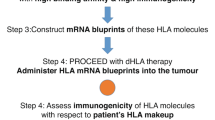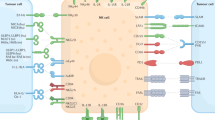Abstract
CELL-MEDIATED immunity is of fundamental importance for transplantation immunity and delayed hypersensitivity reactions. The actual mechanism by which the immunologically triggered lymphocytes exert their effect is unclear, but it is known that the reactions obey immunological rules of specificity. Initiation of the reactions is probably based on immunological recognition. By the development of in vitro techniques to investigate cell-mediated immunity, the specificity of cytotoxic reactions caused by lymphocytes from sensitized donors has been confirmed. These techniques also led to the discovery that non-sensitized lymphocytes could exert a cytotoxic effect on target cells in vitro1–4, provided the lymphocytes were stimulated by certain substances or processes. During studies of various reactions responsible for triggering human lymphocytes into a cytotoxically active state, it was found that lymphocytes exposed to one inductive agent became unresponsive to another which by itself could initiate cytotoxicity. This suggests the existence of previously unknown pathways of lymphocyte reactivity, which may be important in understanding the mechanism of lymphocyte cytotoxicity in graft rejection, and of cellular pathways for the establishment of unresponsiveness in previously competent lymphocytes, which may be important in cellular reactions involved in immunological tolerance.
This is a preview of subscription content, access via your institution
Access options
Subscribe to this journal
Receive 51 print issues and online access
$199.00 per year
only $3.90 per issue
Buy this article
- Purchase on Springer Link
- Instant access to full article PDF
Prices may be subject to local taxes which are calculated during checkout
Similar content being viewed by others
References
Möller, G., and Lundgren, G., in Biological Recognition Phenomena (edit. by Smith, R. T.) (in the press).
Holm, G., and Perlmann, P., Nature, 207, 818 (1965).
Möller, G., Beckman, V., and Lundgren, G., Nature, 212, 1203 (1966).
Holm, G., and Perlmann, P., J. Exp. Med., 125, 721 (1967).
Holm, G., Exp. Cell Res., 48, 334 (1967).
Lundgren, G., Zukoski, C., and Möller, G., Clin. Exp. Immunol., 3, 817 (1968).
Möller, G., Clin. Exp. Immunol. (in the press).
Ruddle, N. H., and Waksman, B., Science, 157, 1060 (1968).
Mosedal, B., Felstead, K. J., and Parke, J. A. C., Nature, 218, 983 (1968).
David, J. R., Fed. Proc., 27, 6 (1968).
Bloom, B. R., and Bennet, B., Fed. Proc., 27, 13 (1968).
Ramseier, H., Science, 157, 554 (1967).
Medawar, P. B., in Ciba Foundation Symposium on Antilymphocytic Serum (1967).
Woodruff, M. F. A., in Tissue and Organ Transplantation (edit. by Porter, K.), 466 (1967).
Author information
Authors and Affiliations
Rights and permissions
About this article
Cite this article
LUNDGREN, G., COLLSTE, L. & MÖLLER, G. Cytotoxicity of Human Lymphocytes: Antagonism between Inducing Processes. Nature 220, 289–291 (1968). https://doi.org/10.1038/220289a0
Received:
Revised:
Issue Date:
DOI: https://doi.org/10.1038/220289a0
This article is cited by
-
Morphological changes in normal lymphocytes treated with phytohemagglutinin and methotrexate following their interaction with targe cells
Bulletin of Experimental Biology and Medicine (1974)
-
In vitro response of human leukocytes to anti-human-thymocyte globulin
Experientia (1972)
-
Failure of Certain Cytotoxic Lymphocytes to respond mitotically to Phytohaemagglutinin
Nature (1970)
-
Release of Migration Inhibitory Factors from Immune Rat Lymphocytes confronted with Histocompatibility Antigens
Nature (1969)
Comments
By submitting a comment you agree to abide by our Terms and Community Guidelines. If you find something abusive or that does not comply with our terms or guidelines please flag it as inappropriate.



